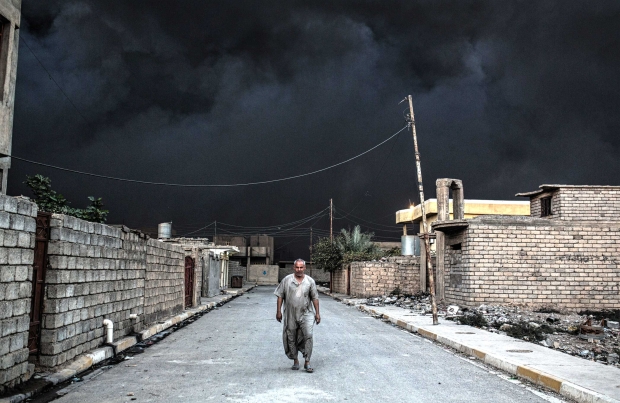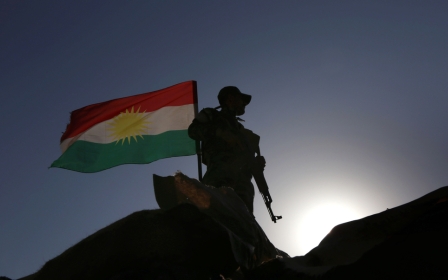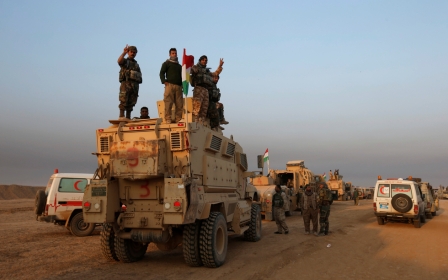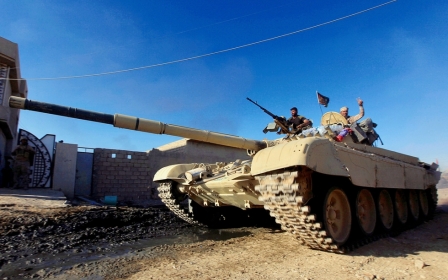Mosul: Iraqi forces have tortured and killed villagers, say rights groups
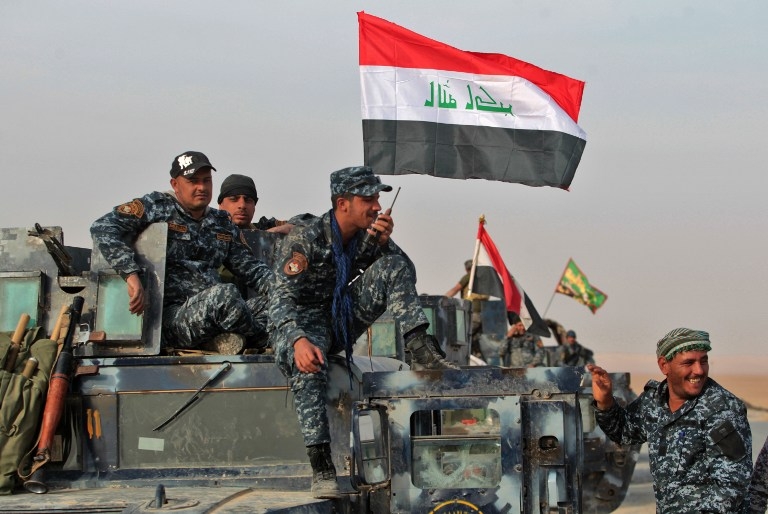
Iraqi government forces killed and tortured civilians south of Mosul, rights groups said on Thursday, the first such reports of alleged abuse in a US-backed campaign to retake the city from Islamic State militants.
Amnesty International said "up to six" people were found dead last month in the Shura and Qayyara sub-districts - the six were suspected by security forces of having ties to the ultra-hardline militant group that seized a third of Iraqi territory in 2014.
"Men in federal police uniform have carried out multiple unlawful killings, apprehending and then deliberately killing in cold blood residents in villages south of Mosul," said Lynn Maalouf, deputy director for research at Amnesty's Beirut office.
'Men in federal police uniform have carried out multiple unlawful killings, apprehending and then deliberately killing in cold blood residents in villages south of Mosul'
- Lynn Maalouf, Human Rights Watch
Human Rights Watch (HRW) said at least 37 men suspected of being affiliated with Islamic State had been detained by Iraqi and Kurdish forces from checkpoints, villages, screening centres and camps for displaced people around Mosul and Hawija, further south.
Relatives said they did not know where most of the men were being held and had not been able to contact any of them while in detention, according to the report.
HRW warned that such conduct "significantly increases the risk of other violations," including torture.
An Interior Ministry spokesman denied there had been any violations and said Iraqi forces respect human rights and international law. A spokesman for Iraq's federal police could not be reached for comment.
A spokesman for the Kurdish regional government denied the HRW report, saying any delays in informing families were limited and due to limited resources. "Nobody has been kept in unknown facilities. They are kept in identified facilities," said Dindar Zebari.
The Mosul operation, involving a 100,000-strong alliance of troops, security forces, Kurdish Peshmerga and Shia Muslim militias and backed by US-led air strikes, has entered its fourth week but has so far gained just a small foothold in the city.
Despite waving a white cloth and lifting their shirts to show that they were not wearing explosive belts and did not pose a threat, about 10 men and a 16-year-old boy, mainly from the villages of Na’na’a and al-Raseef, were tortured by a group of men wearing federal police uniforms, reported Amnesty International.
Amnesty said that, without accountability, the alleged abuses risked being repeated in other towns and villages as the Mosul offensive continues.
And on Friday, a graphic video emerged online that showed a boy getting purposely crushed by a tank seemingly manned by anti-IS forces, prompting outrage. Details of the boy and the people who killed him remain unknown at this time.
Peshmerga forces detain civilians
Meanwhile, Iraqi and Kurdistan Regional Government (KRG) forces have detained at least 37 men from areas around Mosul and Hawija suspected of being affiliated with IS since the beginning of the Mosul operation, Human Rights Watch said Thursday.
Human Rights Watch spoke to 46 relatives and witnesses, who described how security forces took the men from checkpoints, villages, screening centres, and camps for displaced people.
Most said that they did not know where the men are being held and all of them said that the men have not been able to contact them while in detention.
“On top of the danger and anxiety facing civilians fleeing ISIS control, some are now being detained and denied contact with their families by Iraqi and KRG authorities,” said Lama Fakih, deputy Middle East director at Human Rights Watch.
“When detainees are held without contact with the outside world, in unknown locations, that significantly increases the risk of other violations, including ill-treatment and torture,” added Fakih.
Civilians paying the price
This is not the first time that human rights organisations have documented extrajudicial executions by men in the Iraqi government forces.
During the operations to retake Fallujah and surrounding areas in May 2016, at least 16 men and boys were shot dead near Sijir after handing themselves over to fighters wearing federal police uniforms.
'Countries that support Iraqi security forces and the Popular Mobilisation Forces should insist that Baghdad bring an end to this deadly abuse'
- Joe Stork, Human Rights Watch
Members of Shia militias, backed by the Iraqi government, abducted and killed scores of Sunni residents in a central Iraqi town and demolished their homes and shops during January 2016, reported Human Rights Watch.
“Again, civilians are paying the price for Iraq’s failure to rein in the out-of-control militias,” said deputy Middle East director at Human Rights Watch Joe Stork at the time.
“Countries that support Iraqi security forces and the Popular Mobilisation Forces should insist that Baghdad bring an end to this deadly abuse,” he added.
Also, during the operations to retake Tikrit from IS in March and April 2015, Shia militias backed by the Iraqi government deliberately destroyed homes and shops, said a Human Rights Watch report.
According to international human rights law, deliberate killing of civilians and unjustified destruction of civilian property when committed in the context of an armed conflict are serious violations of international humanitarian law and may amount to war crimes.
This article is available in French on Middle East Eye French edition.
New MEE newsletter: Jerusalem Dispatch
Sign up to get the latest insights and analysis on Israel-Palestine, alongside Turkey Unpacked and other MEE newsletters
Middle East Eye delivers independent and unrivalled coverage and analysis of the Middle East, North Africa and beyond. To learn more about republishing this content and the associated fees, please fill out this form. More about MEE can be found here.


